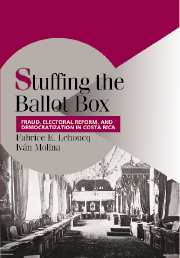Book contents
- Frontmatter
- Contents
- List of Tables and Figures
- Preface
- INTRODUCTION
- 1 ELECTORAL FRAUD DURING INDIRECT AND PUBLIC ELECTIONS, 1901–12
- 2 INSTITUTIONAL CHANGE, ELECTORAL CYCLES, AND PARTISANSHIP, 1910–4
- 3 ELECTORAL FRAUD DURING THE PUBLIC BALLOT,1913–23
- 4 INSTITUTIONAL CHANGE, ELECTORAL CYCLES, AND PARTISANSHIP, 1924–8
- 5 ELECTORAL FRAUD DURING THE SECRET BALLOT, 1925–48
- 6 POLITICAL POLARIZATION, ELECTORAL REFORM, AND CIVIL WAR, 1946–9
- CONCLUSION: BALLOT-RIGGING AND ELECTORAL REFORM IN COMPARATIVE PERSPECTIVE
- Index
- Cambridge Cultural Social Studies
CONCLUSION: BALLOT-RIGGING AND ELECTORAL REFORM IN COMPARATIVE PERSPECTIVE
Published online by Cambridge University Press: 16 July 2009
- Frontmatter
- Contents
- List of Tables and Figures
- Preface
- INTRODUCTION
- 1 ELECTORAL FRAUD DURING INDIRECT AND PUBLIC ELECTIONS, 1901–12
- 2 INSTITUTIONAL CHANGE, ELECTORAL CYCLES, AND PARTISANSHIP, 1910–4
- 3 ELECTORAL FRAUD DURING THE PUBLIC BALLOT,1913–23
- 4 INSTITUTIONAL CHANGE, ELECTORAL CYCLES, AND PARTISANSHIP, 1924–8
- 5 ELECTORAL FRAUD DURING THE SECRET BALLOT, 1925–48
- 6 POLITICAL POLARIZATION, ELECTORAL REFORM, AND CIVIL WAR, 1946–9
- CONCLUSION: BALLOT-RIGGING AND ELECTORAL REFORM IN COMPARATIVE PERSPECTIVE
- Index
- Cambridge Cultural Social Studies
Summary
Introduction
This book began with the puzzle of why incumbents relinquish their power to stuff the ballot box. Making elections fairer and more transparent raises the possibility that elected officials may lose control of the state. And, for both incumbents and opposition movements, increasing safeguards for citizens only augments the uncertainty of electoral outcomes. Understanding why parties reform electoral laws from which they benefit is one of the core objectives of this book.
We also set out to meet the challenge of studying electoral fraud – a set of illicit activities that remain poorly understood. Though the past and present of democratization are replete with references to how incumbents steal elections, only a few studies analyze how parties stuff the ballot box. No research exists explaining how institutional reform shapes the nature, extent, and magnitude of electoral fraud. In this book, we examine the petitions to nullify electoral results – the formal complaints that parties filed with Congress in the aftermath of elections – to develop a quantitative and qualitative portrait of ballot-rigging during the first half of the twentieth century.
Stuffing the Ballot Box focuses on Costa Rica, a country where parties began to compete in regularly scheduled elections in the nineteenth century. We begin our analysis in 1901, when competitive party politics took off, and end it in 1948, when institutional reforms completely removed the executive and legislature from electoral governance.
- Type
- Chapter
- Information
- Stuffing the Ballot BoxFraud, Electoral Reform, and Democratization in Costa Rica, pp. 228 - 268Publisher: Cambridge University PressPrint publication year: 2002



